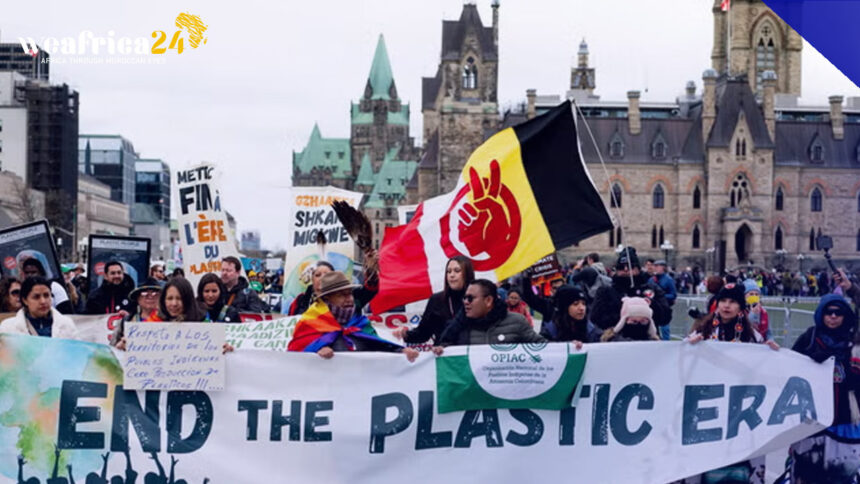In response to the growing issue of plastic pollution, thousands of delegates from around the world have gathered in Ottawa, Canada this week for the International Plastics Negotiations.
The overarching objective of the negotiations is the formulation of a comprehensive treaty on plastics pollution by the year’s end, by the timeline set forth by the United Nations. In March 2022, 175 nations pledged to establish the first legally binding treaty addressing plastics pollution, including its pervasive impact on marine environments, by the culmination of 2024.
Each day, an alarming equivalent of 2,000 garbage trucks laden with plastic waste inundates the world’s oceans, rivers, and lakes, as reported by the United Nations Environment Programme. The repercussions are manifold, with individuals increasingly exposed to microscopic plastic particles through air, food, and water consumption.
The task before negotiators is multifaceted, necessitating the refinement of the existing treaty draft and the delineation of its scope. Crucial considerations include whether the treaty will prioritize human health and environmental preservation, restrict plastic production, or regulate the usage of certain chemicals inherent in plastic manufacturing. A coalition of nations advocating for ambitious action seeks to address these facets comprehensively.
Conversely, there exists a faction advocating for a narrower focus on plastic waste management and bolstered recycling initiatives, aligned with the preferences of plastic-producing entities and oil and gas exporters. The compressed timeline for negotiations underscores the exigency of the issue at hand, prompting concerted efforts to expedite deliberations.
The ongoing summit marks the fourth in a series of five meetings convened by the United Nations’ Intergovernmental Negotiating Committee for Plastics, signaling a pivotal stage in the treaty formulation process.
Amidst burgeoning plastic production forecasts, projections indicate a potential doubling or tripling of global output by 2050 absent intervention. Recent research from the Lawrence Berkeley National Laboratory underscores the significant climate impact of escalating plastic production, with emissions expected to surge commensurately.
The imperative for transitioning away from fossil fuel-dependent plastic production is accentuated by the global commitment to curbing greenhouse gas emissions, as exemplified by the consensus reached at the United Nations climate talks.
The complexity of the plastics debate encompasses a spectrum of issues ranging from production practices to disposal strategies. Proposed measures span from consumer-centric interventions such as labeling initiatives to more intricate regulatory frameworks addressing emissions from production facilities and the utilization of carcinogenic additives.
Moreover, calls to integrate biodiversity concerns into the treaty framework have gained traction, emphasizing the deleterious impact of plastics on ecosystems and species diversity. The International Union for Conservation of Nature underscores the interconnectedness of plastic pollution and biodiversity loss, underscoring the imperative for holistic solutions.
Amidst divergent perspectives and complex policy considerations, the pursuit of a robust, inclusive treaty remains paramount. As the negotiations unfold, stakeholders must navigate the intricate terrain of plastic governance, guided by the shared commitment to mitigating the multifaceted perils of plastic pollution and safeguarding the planet for future generations.







